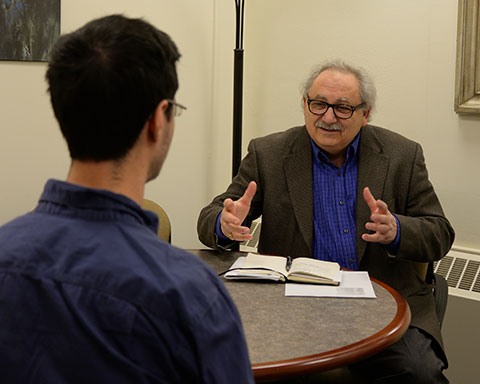Sam Beck's book frames anthropology as a means of change
By Susan Kelley

Social and cultural anthropologist Sam Beck is a leading proponent of moving anthropology out of academia’s ivory tower and into communities and cultures to bring about positive change.
He has been a fixture in the New York City neighborhood of North Brooklyn for more than two decades, where he has studied the effects of gentrification and supported community groups rallying for more affordable housing for ethnic minorities.
Beck has brought that experience to bear as co-editor of a new book, “Public Anthropology in a Borderless World.” With 10 essays in three thematic sections, the edited volume explores how public anthropology improves the modern human condition by actively engaging with people to make changes through research, education and political action. Beck has also contributed a chapter, “Urban Transitions: Graffiti Transformations.” He co-edited the book with Carl Maida of the University of California, Los Angeles.
Public anthropology is a relatively new term that refers to the discipline as a collaboration between the anthropologist and communities to co-construct research and knowledge and communicate that knowledge to a variety of audiences. It also advocates for anthropologists to engage in various forms of intervention, including political action.
American anthropologists, Beck says, have a rich history of positioning themselves in the struggle for social justice and democratization. “Critical and political, [public anthropology] embraces advocacy and at times activism, not just as a strategy for generating data but as a commitment to support and effect change for society’s most vulnerable members and for those living in oppressive conditions,” Beck and Maida write in the introduction.
The first set of essays focus on participatory action research, in which professional anthropologists do research and take action with the community they study, not “on” or “for” them. The essays give examples of how the approach has forged pathways for community empowerment at the Field Museum of Natural History in Chicago and addressed environmental justice concerns in a working-class Latino community in Pacoima, California.
Critical issues facing public anthropological engagement is the subject of the book’s second section. Topics range from how the anthropologist can at once serve as scientist and public social critic, to the promises and pitfalls of activist research.
The final essays seek to understand public anthropology in diverse arenas, from radio and television to visual culture to urban design. In this section, Beck’s chapter shows how urban graffiti, created in and of low-income communities of color, became a commodity for mass consumption, often without attribution.
“Together, the contributors to this volume reposition public anthropology as an anthropology of and in communities that meaningfully and productively engages in a world of intensifying disparities to fulfill a real-world purpose,” Beck and Maida conclude in the introduction.
Beck is senior lecturer in the College of Human Ecology and directs Cornell’s Urban Semester Program in New York City.
Media Contact
Get Cornell news delivered right to your inbox.
Subscribe